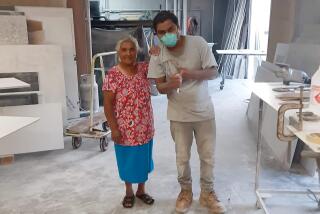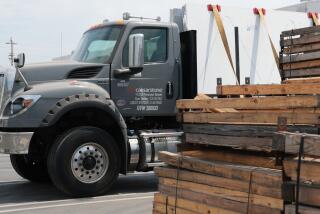A Deep Disagreement : Council’s Rejection of Plans to Expand United Rock Quarry Touches Off Dispute
- Share via
Half a century after gravel mining formed the foundation for the city of Irwindale, disputes over one quarry are pitting neighbor against neighbor and calling into question the identity of this close-knit industry town.
On Oct. 27, the City Council denied United Rock Products’ request to deepen two of its quarry pits from 150 to 275 feet, which would have allowed the company to continue mining for an additional 10 to 12 years. The company says it will be forced to close within a few years if its request isn’t granted, and it has challenged the decision in court.
Although details of the dispute are highly technical, the controversy surrounding it has touched off debate about the city’s future.
The proposal’s opponents, many of whom live on the edge of the quarry, say they fear that further excavation could contaminate ground water, disturb the seismic stability of their properties and raise dust particles that may threaten their health--even their lives.
The company and its supporters argue that the health hazards are minimal, and that other risks can be controlled through proper management. They say United Rock is one of the few secure sources of jobs and income in Irwindale, a good-neighbor business that takes care of its employees and contributes generously to city-sponsored philanthropies. They say that if the excavation proposal isn’t approved, the city’s bedrock industry could go the way of the dinosaurs.
United Rock operates three quarry pits in Irwindale--half of the active pits in the city. Cal Mat and Livingston Graham operate the others. That’s less than a third the number of pits than there were in the 1940s and ‘50s, during Irwindale’s rock and gravel boom.
Revenue from the mining industry bought Irwindale residents a unique level of city services. Now United Rock and its supporters warn that by forcing the company to close, the city will damage itself financially.
“I think (turning down the quarry’s proposal) changes the makeup of the city quite a lot,” said United Rock’s operations manager Arnold Brink. “It practically disintegrates their tax base. A lot of the perks that the residents of the city get are a result of the sand and gravel industry. If they kick the sand and gravel industry in the heels, why, it’s going to come back to haunt them.”
But others say it’s about time the city sought new sources of income.
“Part of the opposition to the continuing deepening of the pits was that the community has had enough of gravel quarrying, and that it’s time to move on and use those sites from other purposes, and to move away from a continuing identity as a location of rock quarries.”
Those rock quarries, however, help pay for city perks ranging from free haircuts for senior citizens, to home improvement grants, prescription drug coverage and a municipal scholarship fund. Part of the money for these services comes from United Rock’s business license fees, along with sales, property and mining taxes, which amount to almost $1 million a year, Brink said. And in exchange for permission to deepen the pits, the company offered Irwindale a lump sum of $3.5 million and a contribution of at least $20,000 a year to the city’s scholarship fund.
The city’s reserves, up to a high of $35 million in 1987, are projected to be only about $4.6 million by the end of the fiscal year in June, City Manager David Caretto said.
United Rock and related businesses on its site employ about 300 people, at least 10% of whom are Irwindale residents, Brink said. And the company buys about 20% of its supplies from within the city, he added.
Although reclamation of the pits could yield new revenues from the industries that would take their place, a financial analysis commissioned by the city suggests that usage wouldn’t replace the money from the quarries.
But opponents of the proposal call United Rock’s offer a kind of bribe.
“We resent the obvious attempt by United Rock to ‘buy’ additional depth by offering the city, and scholarship fund, money in one form or another,” the petition against the proposal states. “Such ‘payoff’ is too little and too late; money can never cover the costs and suffering of the residents.”
Jose J. Vargas, who has lived next to the quarry for eight years, says dust from the quarry exacerbated his son’s asthma; the son died of asthma last year at the age of 33. No amount of financial compensation can replace that, he said.
The company denies that the death is related to dust from its operations. In fact, Brink said, a sprinkler system installed around the edge of the quarry prevents most dust from even reaching the homes.
The environmental impact report on the project gives credence to the neighbors’ complaints and the company’s contention that it can resolve them. However, the report also recommends measures to reduce these problems, and Brink said United Rock is willing to do more than required. The company already voluntarily monitors water quality in its pits four times a year, he said. And they are willing to go above and beyond other health and safety measures detailed in the report.
On Monday, United Rock filed a lawsuit against the city in Los Angeles Superior Court, charging that the city violated its own rules by refusing the proposal, which the Planning Commission had previously approved.
City Council members did not return phone calls from The Times.
More to Read
Sign up for Essential California
The most important California stories and recommendations in your inbox every morning.
You may occasionally receive promotional content from the Los Angeles Times.













